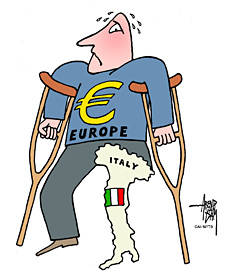Might we see Italy go careening off the edge in the next few days? I mean, even more than it has?
The Financial Times suggests that we might, writing of a “danger zone” in an article published Nov. 7: “Italian 10-year bond yields rose to euro-era highs of 6.68 percent at one point, well into territory considered unsustainable by the markets. Traders warned that without [European Central Bank] intervention, the Italian bond markets would have seen leaps in yields that forced Ireland and Portugal to accept emergency bailouts.”
I’m trying to think about this, so a few observations.
First, there is a potential vicious circle in which higher rates raise Italy’s interest burden and push the country into defaulting. This is real; the question is how quickly it can operate given the fairly long maturity of Italian debt.
Second, there is the question The Financial Times raises, about whether rising spreads will trigger an increase in required margins.
I would consider the margin question part of a broader issue, which I think of as Shleifer-Vishny, after the classic paper written by the economists Andrei Shleifer and Robert W. Vishny on the limits of arbitrage. Their point was that a fall in the price of some asset, even if it should in principle present a buying opportunity if the fundamentals haven’t changed, may actually be self-reinforcing instead if there is a limited class of leveraged investors who buy that asset. Why? Because the capital losses those investors suffer may force them to pull back instead of piling on.
I can see this happening here. Most Italian debt may be held by stolid domestic players, but at the margin are financial institutions that are quite possibly going to be forced to cut their holdings if Italian interest rates rise, because this will reduce the value of the bonds they already hold. So things could quite possibly go blooey in the very near future.
Of course, this is yet another reason for the E.C.B. to come in and short-circuit this process. Hello, Mario? The next few days could be very interesting.
‘Crats, Maybe, But Not Much Techno
The blogger Atrios complains, rightly, about the common description of the policies being followed in Europe as “technocratic.” His point, published in a Nov. 2 post on Eschaton, is that “we’ve conjured up images of very sensible highly educated wonky people doing the right thing, even as they destroy the world.”
But it’s more than that: these alleged technocrats have in fact systematically ignored both textbook macroeconomics and the lessons of history in favor of fantasies. The European Central Bank has placed its faith in the confidence fairy, while imagining that it can run policy in a way that has never worked in several centuries of central bank experience. Meanwhile, the European policy elite have simply wished away the clear evidence that the euro zone needs to make an adjustment that is virtually impossible unless inflation targets are raised.
The point is that I know technocrats, and these people aren’t — they’re faith healers who are making stuff up to suit their prejudices.
You can say something similar, although a bit less pointed, about the Obama administration. The line from people there, including the president, has been that they were too technocratic.
But the real technocrats — people like Christy Romer, the former chairwoman of President Obama’s Council of Economic Advisers, and, well, me — were saying right from the beginning that the stimulus was too small, etc. People who opposed stronger action, like Treasury Secretary Tim Geithner, were basing their position on gut feelings about confidence, not number-crunching.
And by and large, people who did the numbers have gotten it mostly right; it’s precisely because we’re ruled by ‘crats who trust their guts rather than the techno that we’re in such trouble.
Truthout has licensed this content. It may not be reproduced by any other source and is not covered by our Creative Commons license.
Paul Krugman joined The New York Times in 1999 as a columnist on the Op-Ed page and continues as a professor of economics and international affairs at Princeton University. He was awarded the Nobel in economic science in 2008.
Mr Krugman is the author or editor of 20 books and more than 200 papers in professional journals and edited volumes, including “The Return of Depression Economics” (2008) and “The Conscience of a Liberal” (2007). Copyright 2011 The New York Times.
Matching Opportunity Extended: Please support Truthout today!
Our end-of-year fundraiser is over, but our donation matching opportunity has been extended! All donations to Truthout will be matched dollar for dollar for a limited time.
Your one-time gift today will be matched immediately. Your monthly donation will be matched for the whole first year, doubling your impact.
This matching gift comes at a critical time. As Trump attempts to silence dissenting voices and oppositional nonprofits, reader support is our best defense against the right-wing agenda.
Help Truthout confront Trump’s fascism in 2026, and have your donation matched now!
